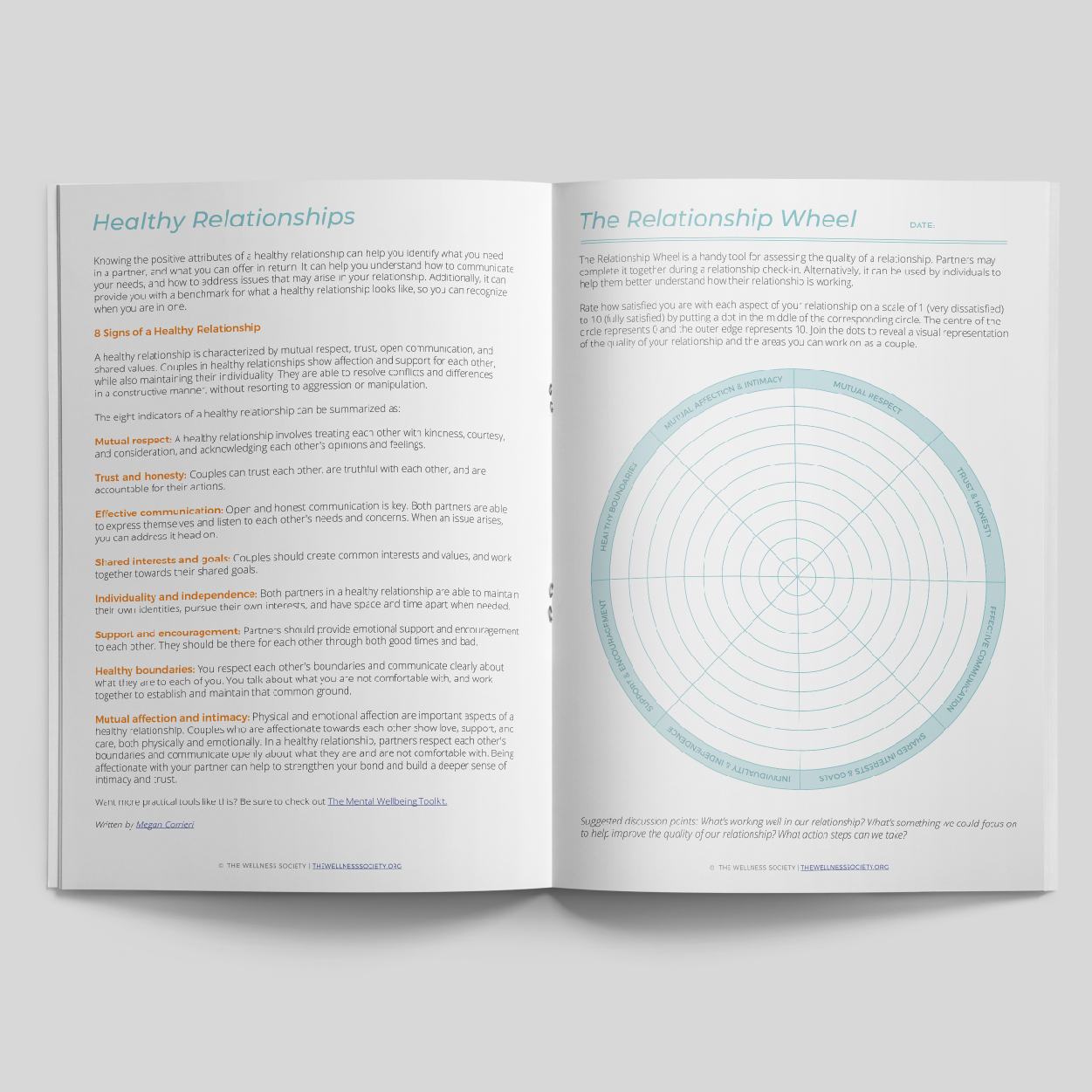Healthy relationships are essential for a fulfilling and satisfying life. Love, intimacy, and romance are undoubtedly important, but they are just one aspect of a relationship.
For a relationship to be truly healthy, it must be built on a foundation of respect, trust, communication, and mutual support.
When partners respect each other's values and boundaries, trust each other to be honest and faithful, communicate effectively and openly, and provide support during difficult times, their relationship is more likely to thrive.
A healthy relationship can have a positive impact on every aspect of your life. Research has shown that people in healthy relationships experience better mental and physical health, greater life satisfaction, and increased longevity.
They are also more likely to achieve their goals, pursue their passions, and feel a sense of purpose and meaning in their lives.
In this article, we'll explore the necessary components of a healthy relationship, and how deepening your knowledge of healthy relationships can benefit you.
Why Identify the Positive Attributes of a Healthy Relationship?
Knowing the positive attributes of a healthy relationship can help you identify what you need in a partner, and what you can offer in return.
It can also help you understand how to communicate your needs, and how to address issues that may arise in your relationship.
Additionally, it can provide you with a benchmark for what a healthy relationship looks like, so you can recognize when you are in one.
8 Signs of a Healthy Relationship
A healthy relationship is characterized by mutual respect, trust, open communication, and shared values.
Couples in healthy relationships show affection and support for each other, while also maintaining their individuality. They're able to resolve conflicts and differences in a constructive manner, without resorting to aggression or manipulation.
The eight indicators of a healthy relationship can be summarized as:
- Mutual respect: A healthy relationship involves treating each other with kindness, courtesy, and consideration, and acknowledging each other's opinions and feelings.
- Trust and honesty: Couples can trust each other, are truthful with each other, and are accountable for their actions. If you can’t trust your partner or be honest with them, your relationship will cease to exist.
- Effective communication: Open and honest communication is key. Both partners are able to express themselves and listen to each other's needs and concerns. When an issue arises, you’ll be able to address it head on.
- Shared interests and goals: Couples should create common interests and values, and work together towards their shared goals.
- Individuality and independence: Both partners in a healthy relationship are able to maintain their own identities, pursue their own interests, and have space and time apart when needed. If you find yourself unable to do this, one or both of you may be in for a serious disappointment over time.
- Support and encouragement: Partners should provide emotional support and encouragement to each other. They should be there for each other through both good times and bad.
- Healthy boundaries: Respect each other's boundaries, communicate clearly about what they are to each of you. Talk about what you are not comfortable with, and work together to establish and maintain that common ground.
- Mutual affection and intimacy: Physical and emotional affection are important aspects of a healthy relationship. Couples who are affectionate towards each other show love, support, and care, both physically and emotionally. In a healthy relationship, partners respect each other's boundaries and communicate openly about what they are and are not comfortable with. Being affectionate with your partner can help to strengthen your bond and build a deeper sense of intimacy and trust.
Key Tips for Keeping a Healthy Relationship
Key tips for keeping a relationship healthy include setting clear boundaries, practicing empathy and active listening, showing appreciation and gratitude, prioritizing quality time together, and continually working on personal and relationship growth.
Regular check-ins, honest communication, and a willingness to adapt and compromise are also important in maintaining a healthy relationship.
By recognizing the signs of a healthy relationship and implementing these tips, couples can build a strong, fulfilling, and long-lasting connection.
- Practice effective communication: Make sure to actively listen to your partner, and express yourself in a clear and non-confrontational manner. Avoid interrupting or criticizing each other, and take the time to understand each other's perspectives. If there are any misunderstandings, take the time to clarify and ask questions.
- Show appreciation for your partner regularly: This could be in the form of verbal affirmations, thoughtful gestures, or small acts of kindness. Tell your partner what you appreciate about them and how they make your life better.
- Maintain a healthy balance between independence and togetherness: This means respecting each other's personal space, interests, and hobbies, while also spending quality time together. It's important to strike a balance that works for both partners.
- Work together to establish healthy boundaries: Talk openly about what you are and are not comfortable with in the relationship, and establish boundaries that feel respectful and healthy for both partners. Reading books about setting boundaries can provide valuable insights and strategies. For example, you might set boundaries around how much time you spend with friends outside the relationship or how you communicate during disagreements.
- Prioritize quality time together: Make sure to set aside time for each other on a regular basis. This could involve planning date nights, going on vacations together, or just spending a quiet evening at home.
- Be open to compromise and negotiation: In any relationship, there will be disagreements and conflicts. It's important to be open to finding a solution that works for both partners. This might involve compromise or negotiation to find a middle ground.
- Be honest and transparent with each other: This means being truthful with your partner, even when it's difficult. Avoid keeping secrets or hiding things from each other.
- Seek professional help if needed: If you are struggling with issues in your relationship, it's important to seek help from a qualified professional. This might involve couples therapy, individual therapy, or other forms of support.
Learn to Recognize Negative Traits
In any relationship, it's important to recognize negative traits and work towards mitigating them.
Some common negative traits that can lead to relationship problems include poor communication, lack of trust, infidelity, and emotional immaturity.
If you recognize any of these traits in your relationship, it's important to address them head-on.
Apply Actionable Strategies Towards Mitigating Them
Mitigating negative traits in a relationship can be challenging, but it is crucial to ensure a healthy and fulfilling connection with your partner. One of the most effective ways to address negative traits is to identify the root cause and work on it together.
This may involve seeking professional help or having an open and honest conversation with your partner to understand their perspective and feelings.
It is also important to practice active listening and empathy towards your partner, showing them that you value and respect their opinions and emotions.
Additionally, setting clear boundaries and expectations can help mitigate negative behavior, and focusing on positive reinforcement and appreciation can motivate your partner to improve their actions.
Finally, practicing self-care and personal growth can help you become a better partner and lead by example. By applying these actionable strategies, you and your partner can work together to mitigate negative traits and build a healthy and fulfilling relationship.
Identify if You’re in a Codependent Relationship
A codependent relationship is one where one or both partners rely on each other for emotional support and validation to an unhealthy extent.
Codependent relationships are typically intense and challenging to navigate. If you find yourself constantly sacrificing your needs for your partner's or vice versa, it may be time to re-evaluate the dynamic of your relationship.
How Unhealthy Relationships Can Impact Our Physical and Mental Health
Unhealthy relationships can have a significant impact on both our physical and mental health. Constant conflict, emotional abuse, and controlling behavior can cause chronic stress, leading to physical health problems such as headaches, digestive issues, and weakened immune systems.
In addition, unhealthy relationships can contribute to mental health issues such as anxiety, depression, and low self-esteem. The constant negative emotions and feelings of helplessness can take a toll on our mental wellbeing, causing long-term damage.
Furthermore, unhealthy relationships can also affect our behavior and relationships outside of the toxic dynamic. It can cause us to withdraw from social situations, experience difficulties in maintaining healthy friendships, and lead to a distorted perception of what a healthy relationship looks like.
If left unaddressed, an unhealthy relationship can have severe consequences on our overall health and wellbeing. Recognizing the signs of an unhealthy relationship and seeking professional help or support from loved ones is crucial to mitigating the harmful effects of such relationships.
Summary
Healthy relationships are an essential component of a fulfilling life. By deepening your knowledge of healthy relationships, you can increase your chances of finding and maintaining a relationship that brings you happiness, fulfillment, and support.
Remember, a healthy relationship is built on:
- Mutual respect
- Trust and honesty
- Effective communication
- Shared interests and goals
- Individuality and independence
- Support and encouragement
- Healthy boundaries
- Mutual affection and intimacy
By prioritizing these qualities, you can build a strong and fulfilling partnership that will last a lifetime.
Build Your Mental Wellbeing Toolkit
Research shows that self-help materials are often enough for people to overcome mild to moderate mental health difficulties without professional support.
If you’re interested in a self-guided program that includes tools from CBT, ACT and more, be sure to check out The Mental Wellbeing Toolkit. It's "like 10 therapy sessions in one."

About Megan
Megan Corrieri is a nationally certified LPCC with 15+ years of counseling experience.She has expertise in treating various mental health issues such as anxiety, depression, sexual addiction, and offender rehabilitation, for both individuals and couples.
Megan owns and operates NorthStar Counseling and Therapy, a private practice located in Frisco.




